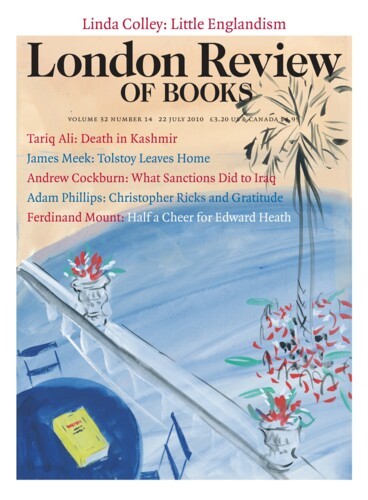An extract from George Osborne’s statement in the House of Commons on the 2010 Spending Review: I am grateful to the work of my right honourable friend, the member for Sumburgh West, in investigating the current provision of organs in this country, and I have considered his recommendations carefully. Good kidney function is an essential part of the workings of a modern, civilised society, and the Coalition is determined to ensure that Britain has kidney function second to none in order that we may punch above our weight in the global economy going forward.
James Meek
James Meek is a contributing editor at the LRB. His new novel, Your Life without Me, will be published in 2026.
The essential moral of Hans Christian Andersen’s story ‘The Emperor’s New Clothes’ for people who live in a modern western democracy is that when the laughing stops, the emperor is still the emperor. Indeed, he is more powerful for having allowed himself to be laughed at. As for the small boy who pointed out his nakedness, he can deal with him later. In his new title sequence for The Simpsons, already shown in the US and due to air in Britain on 21 October, the graffiti artist Banksy tracks away from the Simpson family on its suburban Springfield sofa to show a subterranean Asian sweatshop making Simpsons merchandise. A child dips images of Bart into a vat of acid, kittens are pulped to make stuffing for Bart dolls, the tongue of a beheaded dolphin licks envelopes, an enslaved panda hauls a cart, an exhausted, broken unicorn punches holes in DVDs.
Some Wild Creature: Tolstoy Leaves Home
James Meek, 22 July 2010
What are we saying when we say someone has ‘gone out of their mind’? The thing about going out of your mind is that the mind is still there; you can go back. You haven’t lost your mind. You’ve just gone out of it. The Russians use the same phrase. The Russian adjective meaning ‘crazy’, which is the same as the noun for ‘insane person’, is sumasshedshy, literally ‘who was going out of their mind’. Sofia Andreyevna Tolstoy, wife of Lev Nikolayevich Tolstoy, did go out of her mind at the family estate of Yasnaya Polyana in 1910. She didn’t lose her mind. She went back to it later, and lived another nine years. But she did lose her husband, who ran away from her and died of pneumonia in a rural stationmaster’s house a few days later.
The story of Russia’s deep cover suburban spies in America is the perfect pitch for a 13-part TV series. It’s The Wire (illegals v. law enforcers), The Sopranos (aspirational lifestyles and typical middle-class problems among people living dangerous secret lives) and V (aliens among us) rolled into one. Lost? They do seem to have been. Like Nigerian email fraudsters, whose sensational Moll Flanders-like tales of inheritances and warped morality suggest their talented authors would make more money bashing out African soap opera scripts than they ever would ripping off naive northerners, the easiest way for the Russian taxpayer to get back the money wasted on this loony espionage venture would be to deport the spymasters responsible to Los Angeles with a contract for a 50 per cent cut of whatever the going Screenwriters Guild rate is these days.
Polly the Bleeding Parrot: David Peace
James Meek, 6 August 2009
Stories rely on mystery. Who killed the old lady? We don’t know, so we read on to find out. Perhaps we do know, so we read on to see if the killer will be caught. It may be that we know the culprit’s identity, and know they’ll be caught, but we read on to find out how, and why they did it. Or perhaps we know all these things, but, having been introduced to a set of...
Podcasts & Videos
Putin's Mistake
James Meek and Thomas Jones
James Meek talks to Tom about the events leading up to Russia’s invasion of Ukraine, from the fall of Yanukovych to the wars in the Donbas and Nagorno-Karabakh, and considers what may happen next.
Between Mykolaiv and Kherson
James Meek
James Meek reports from Mykolaiv and the area of southern Ukraine that has become a crucial battleground in the war, as Russian forces seek to maintain control of the land they’ve occupied west of the...
Between Mykolaiv and Kherson
James Meek and Thomas Jones
James Meek, recently returned from Mykolaiv, talks to Tom about the area of southern Ukraine that has become a crucial battleground in the war, as Russian forces seek to maintain control of the land they’ve...
Shamed in Afghanistan
James Meek
James Meek reads from his piece on the British army’s eight years in Afghanistan.
Robbing the Poor
James Meek
James Meek argues that the Robin Hood myth has been turned on its head by the wealthiest and most powerful, so that those who were previously considered 'poor' are now accused of wallowing in luxury.
James Meek: Dreams of Leaving and Remaining
James Meek
James Meek talks to Chris Bickerton about his new book, Dreams of Leaving and Remaining, which features writing published originally in the LRB.
Tony Wood and James Meek: Russia without Putin
James Meek and Tony Wood
Tony Wood talks to James Meek about his book Russia with Putin, which looks at, among other things, the legacy of Soviet infrastructure and the extent of political opposition in today’s Russia.
James Meek on Healthcare: from WHO to NHS
David Runciman and James Meek
David Runciman talks to James Meek about what the Covid crisis has revealed about how we understand healthcare and how we think about the organisations tasked with delivering it. Their conversation covers...
Pieces about James Meek in the LRB
Planes, Trains and SUVs: James Meek
Jonathan Raban, 7 February 2008
James Meek’s last, bestselling novel, The People’s Act of Love, published in 2005 to great critical acclaim, was set in 1919, in ‘that part of Siberia lying between Omsk and...
Dynamite for Cologne: James Meek
Michael Wood, 21 July 2005
James Meek’s early fiction is alert, acrid and funny, and only slightly too insistent on its own quirkiness – as if it were hoping reviewers would call it surreal (they did) and...
Read anywhere with the London Review of Books app, available now from the App Store for Apple devices, Google Play for Android devices and Amazon for your Kindle Fire.
Sign up to our newsletter
For highlights from the latest issue, our archive and the blog, as well as news, events and exclusive promotions.



